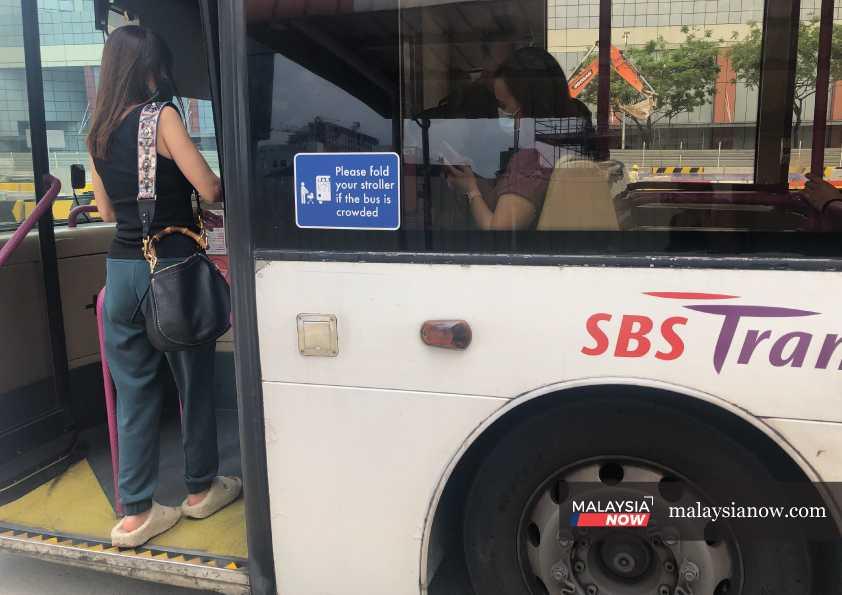The Singapore dream that became a nightmare for Malaysian bus drivers
They say they were unfairly treated, but have little hope for recourse after losing an initial attempt to bring their complaints to court.
Just In
Michael (not his real name) worked as a bus driver for a public transportation company in Singapore for six years, from 2014 to 2020.
Now back in Malaysia and selling nasi lemak to make ends meet, the 34-year-old is left with a sour taste in his mouth from his experience in the city-state.
Michael's story began in 2013, when he moved to Singapore to look for work. At the end of December that year, he managed to land a spot at SBS Transit Ltd. Work began the following year.
"After three months of training, we went through a traffic police test. After that, they released us into service," he said.
But there were some things that he and several other workers were uncomfortable with, and which they say amounted to unfair treatment against them.
"We were not allowed to take MC," he said. "If we took MC, they would reject our bonus payments."
Throughout his stint with SBS, Michael lived in Johor and made the daily trip across the causeway in order to get to work.
He started off with a basic salary of S$1,350 (RM4,340), which had increased to S$1,970 (RM6,334) by 2020.
His shift would begin at 2pm and end at about midnight. Once his shift ended, he would drive his bus back to the depot to be cleaned, and to take care of several other matters.
It would be close to 2am before he could finally begin making his way back to Johor Bahru.
"They insisted that we work on public holidays," he said. "They wanted you to work all day long, like a robot."
Michael worked seven days a week, after which he would be given the eighth day off.
He had been at SBS barely a month before he began feeling that he was being unfairly treated.
But for the sake of keeping his job and the pay cheque that arrived at the end of each month, he decided to lie low.
Eventually, though, he and 12 others agreed to initiate legal action.
The first lawsuit was brought by bus driver Chua Qwong Meng in 2019 and went to trial in March of this year.
On Aug 26, the Singapore High Court dismissed all of Chua's claims, dashing any hope that the other 12 had of making a case.
Of the 13 bus drivers, nine were Malaysians.
"Before all of this went to court, I discovered through the Ministry of Manpower website that the working week should be 44 hours," Michael said.
He raised this with his union but did not receive an encouraging response.
After SBS learnt of his involvement in the suit, he said it began to "target" him.
"My manager would go to the side of the road to take my speed reading," he said.
"This is a job normally done by the ticket officer."
Another former driver at the same company who spoke to MalaysiaNow expressed his disappointment at the outcome of the case.
Alex (not his real name) said he did not think that he would be mistreated in this way when he decided to work in Singapore – a place akin to the promised land for many Malaysians who associate the city-state with lucrative incomes in a currency three times the strength of the ringgit.
After two years of working at SBS, though, he found himself harbouring dissatisfaction and anger towards the company's management.
But he dared not complain or kick up a fuss for fear that he would lose his job before he had even finished paying his debts for his bus driving licence.
"I went from Puchong to Singapore after borrowing money from my family," he said.
"I patted myself on the back when I passed the test and landed a job in Singapore. But I feel that I have been treated even worse than the foreign workers in Malaysia."
Now, Alex warns all of his friends who dream of working in Singapore to think twice.
"Life there is hard," he said. "It's not like what people think it is."
When asked where he was working now after leaving SBS, he declined to answer, saying he was worried about "spies" from his former company.
Back in his home town of Semenyih, meanwhile, Michael continues to struggle at his nasi lemak business.
His contract with SBS ended in 2020 due to the Covid-19 pandemic.
At the moment, he is trying to pay off the loans for his house and car which all together cost about RM3,000 a month.
"This nasi lemak business is all I have to get by," he said.
Subscribe to our newsletter
To be updated with all the latest news and analyses daily.
